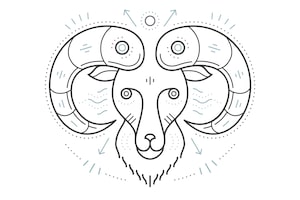Daylight Saving Time begins Sunday, November 5. As the clocks fall backward at 2 a.m., we gain an extra hour of sleep.
We know the benefits of sleep hygiene – set a consistent bedtime routine and wake-up time, get the right pillow for your sleep style, get rid of distractions that make it harder to fall asleep (that means you, cellphone). But just as there are many ways to lose sleep – struggling to doze off, lying awake at night, waking up too early – there are many ways to try to fix your sleep stresses. Within the stories we’ve written about sleep gathered below are tips that may help you on your journey to a full night’s rest.
Read what it’s like to submit to a sleep clinic for testing Discover how some insomniacs actually find getting things done at night helps them fall back asleep. Learn what you should and shouldn’t be eating to make you drowsy. And, when all else fails, have a laugh with our First Person writers who’ve been there, snored through that and found novel ways to get to bed (boring podcasts for the win). Now get some rest!
From sustainable living to self-care, read more of The Globe’s guides to living well
- Is there a scientific reason I can’t sleep?
- What about medical conditions?
- How do I cope with sleep disruptions from my partner and kids?
- How do I find the right mattress and pillow?
- Are there links between food and sleep?
- How do I get rest while travelling?
- Any tips for a better night’s rest?
- When all else fails …
Table of contents
Is there a scientific reason why I can’t sleep?
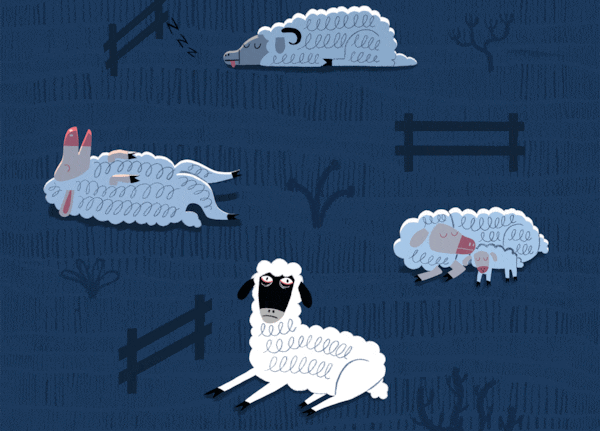
JAMIE BENNETT
Why women sleep worse than men
According to a 2005 Statistics Canada survey, women reported more problems getting to sleep and falling asleep than men (35 per cent versus 25 per cent). After suffering years of bad rest, this writer argues women need to stop glorifying lack of sleep.
Can night owls become early birds?
Larks get sleepy soon after supper, but are bright-eyed and bushy-tailed by the time the sun starts to blush on the horizon. Owls are those late-night party animals who thrive in the wee hours, but struggle to get to that 8 a.m. meeting or class the next day. Why do some of us seem built for the morning while others thrive at night? The answer lies in an individual’s chronotype. Sleep researchers do say it is possible to become an early riser – here are some tips to help you become a morning person.
Tired of being tired? Turns out we’re not as sleep-deprived as we think
Researchers studied the sleep habits of three pre-industrial societies, the Hadza in Tanzania, the San in Namibia and the Tsimane in Bolivia, whose hunter-gatherer and hunter-horticulturalist lifestyles are believed to closely resemble those of ancient humans. What they found was striking: These traditional groups don’t sleep any more than we do; in fact, they sometimes sleep even less.
Author Guy Leschziner explains the mysterious realm of sleep disorders
Reminiscent of the works of the late British neurologist Oliver Sacks, Guy Leschziner’s new book, The Nocturnal Brain: Nightmares, Neuroscience, and the Secret World of Sleep, explores sleep disorders through the remarkable stories of his patients, from one with sexsomnia to another diagnosed with sleep-eating.
Does the switch to daylight time lead to heart attacks and traffic accidents?
It’s often reported that traffic crashes and heart attacks increase in the days immediately after the clocks have been turned forward to daylight time in the spring, when people are still adjusting to the time change. We look at several studies for a reality check on these commonly held beliefs.
What about medical conditions?
DAVE CHAN
Chasing the dream of a good night’s sleep
A full night’s sleep seemed like pure fantasy to Erin Anderssen, until a quest to solve her chronic fatigue led to a failed bake-off, midnight pep talks and a sleepover under the watchful eye of a clinician wielding electrodes
What it’s like to have narcolepsy
Narcolepsy advocate Carrie-Ann Burns describes living with a disorder that affects all aspects of her life: mood, energy, physical fitness, social life, comprehension and retaining information.
How sleep plays a role in depression (and vice versa)
Researchers who have followed people with insomnia over months and years have found that (non-depressed) people who have insomnia are more likely than those without insomnia to subsequently develop major depression. And studies have found that treating insomnia has the pleasant side-effect of enhancing mood.
The dangers of sleeping pills for seniors
As people age, their ability to get a good night’s sleep becomes more elusive. And, to add insult to injury, those who might have reached for a sleeping pill to get through the night when they were younger are no longer good candidates for doing so after age 65 or 70. Side effects can be more pronounced in older people, and they’re at risk from falls.
Why snoring is such a hard problem to fix
Forty years ago, snoring was considered little more than an annoyance. But, in recent years, research has shed light on the harmful health effects of snoring and its more extreme form, obstructive sleep apnea, which can include a heightened risk of cardiovascular disease and mortality. And with rates of snoring believed to be on the rise, partly because of an aging and increasingly overweight population, snorers (and their bedmates) are increasingly in search of solutions. Here’s advice if you’ve been diagnosed with sleep apnea and have trouble adjusting to CPAP, the device which involves wearing a mask that directs air down the throat.
How do I cope with sleep disruptions from my partner and kids?
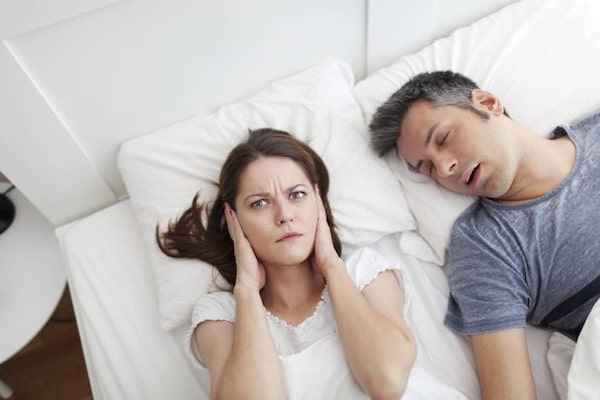
ANABGD/GETTY IMAGES/ISTOCKPHOTO
The night divorce: Why more and more couples are sleeping apart
Slumber-starved couples are upending traditional bedroom setups – supposedly intimate, romantic places where secrets are shared and all the sex happens – instead sleeping solo in spare rooms full-time or shuffling off to some other bed in the house before especially gruelling days at work. The reasons partners flee the bed are varied, but what separate sleepers have in common is desperation for optimal sleep – even though the unconventional arrangement comes with judgment and sidelong glances.
Parenthood and the long road to sleeping again
Many people warn parents-to-be that they’ll never sleep again. For one couple, a pricey robotic bassinet was the answer to helping their newborn sleep better and longer. As this First Person writer discovered, sleep deprivation is something no one can prepare you for until you experience it yourself. Another essay writer wonders if, after the child-rearing years and health issues that affect sleep, it’s ever possible to get a good night’s sleep?
How do I find the right mattress and pillow?
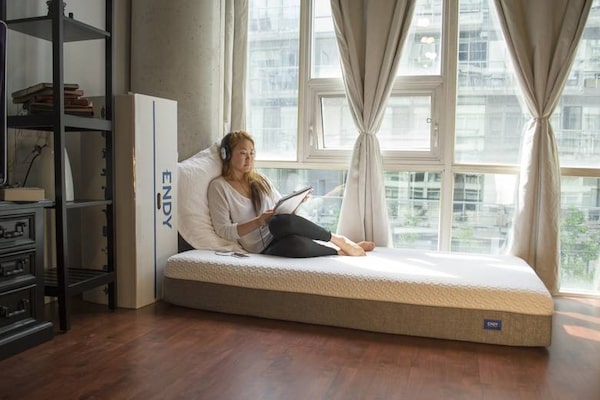
ENDY
From the ‘hipster mattress’ to perfectly personalized beds
The direct-to-consumer online mattress market has its eyes set on the coveted, tech-savvy consumer. What this means for the industry is that the old-fashioned way of marketing mattresses won’t work any more. Enter the hipster mattress, a bed in a box with celebrity buzz and strong social-media presence. Wherever you buy your mattress, sleep experts offer advice for the perfect bed whether you’re a light sleeper, sweaty sleeper or toss-and-turner.
How to choose the right pillow to help you get a better sleep
Unless you’ve been waking up with neck pain, proper pillow selection is likely not on your radar. Most people use a pillow that is well past its prime – if it has lost its original shape, become flat or lumpy or has been in regular use longer than a year, it’s likely ready for replacement. Although there is no single pillow that is best for everyone, some new options allow you to modify the height and firmness.
Are there links between food and sleep?
If you're having trouble sleeping, you might want to take a closer look at what – and how – you're eating. Dietitian Leslie Becks offers some tips for a better night's rest
Globe and Mail Update
What to eat and not eat to help you sleep better
Feeling tired all the time despite getting seven to eight hours of sleep every night? To help you feel energized during the day, adopt smart eating habits to sidestep these nine blunders that rob you of energy. Here’s a selection of foods that can influence the secretion of melatonin, a brain chemical that controls the body’s internal clock to regulate sleep.
Is my insomnia making me gain weight?
There is evidence that sleep loss is linked to weight gain, in particular abdominal weight gain. Too little sleep has been shown to slow the body’s resting metabolism – the number of calories burned at rest – and increase hormones that stimulate appetite and eating.
How do I get rest while travelling?
AIR CANADA
The travel industry wants to put you to sleep
In recent years, the travel and hospitality industry has taken considerable measures to help travelers get adequate sleep, from designing optimal sleep environments, sometimes with the help of doctors and researchers, to providing high-tech devices such as sleep trackers and sound machines. Not only do airlines and hotels aim to provide convenience and comfort while you’re awake, these days, they’re also trying to make sure you rest well along the way.
How to sleep better on a plane
With the right accessories, seating arrangement and timing, you can better your chances of drifting off during your flight. If you’re on an overnight flight, we have a five-step routine to help you nod off and arrive feeling refreshed – and a few tips on how to avoid being a jerk to your fellow travellers.
How to help children cope with jet lag
Before you leave start adapting kids’ sleep schedules to your destination, even by an hour or two, to help make the time change come as less of a shock.
Any tips for a better night’s rest?
Yoga instructor Amber Brown walks us through two yoga poses designed to relax the body and mind at the end of the day. If you have trouble sleeping, these may offer some relief.
The Globe and Mail
Why high-tech gadgets are looking to the past to help us sleep better
With machine learning on the horizon, many sleep aids are expected to become increasingly responsive and customized to help us get the shut-eye we need. The hope is that such innovations will create the optimal environment – that is, one that resembles what it was in the past, before our nights were disrupted by artificial lights, central heating, digital distractions and the stresses of modern life.
Sleep your way to better – and happier – memories
As early as the 1920s, research has shown that memory retention improves after sleep. What we have come to realize since then, however, is that sleep is not just an essential part of improving our ability to remember, but also effects what types of things we actually do remember.
Banking sleep vs. catching up
For shift workers, ultra-endurance athletes and even jet-setting executives, missing sleep is a confidence-sapping occupational hazard with both mental and physical consequences. The solution? It turns out you can ward off some of the effects by “banking” extra sleep in advance, according to research. If you’ve had a restless night, having a nap can help you perform better and protect your body from damage. However, our best intentions to catch up on a sleep debt can lead to inconsistent patterns of sleep – unfortunately, an hour less tonight does not equal an extra hour tomorrow.
Tossing and turning? Sleep coaches have a game plan for that
Traditionally, sleep coaches help parents figure out how to get their little ones to sleep through the night. Companies offer plenty of options at various price points, ranging from 15-minute phone consultations to overnight visits. But some infant and child sleep coaches are branching out into the much more complicated world of adult sleep.
Thoughts keeping you up? How to settle in
Sleep does not arrive quickly to a darting mind. Nor does it arrive when the mind is actively engaged in other activities such as worrying or problem solving. So how do you calm that racing mind in order to sleep? Some people find the best therapy for insomnia is getting things done, trying new hobbies and doing chores well into the night.
When all else fails …
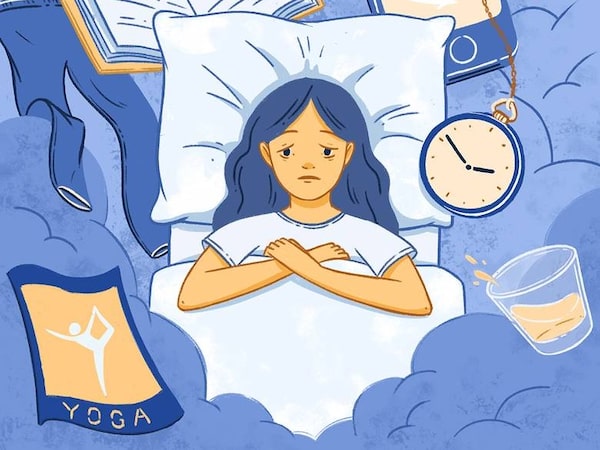
CELIA KRAMPIEN
Take comfort in these First Person pieces about the quest for a good night’s rest:
- To overcome my insomnia, I had to change the way I thought about sleep
- Airway to heaven: How I finally hit snooze on my snoring
- My fear of the dark led me to a new bedtime ritual
- Napping my way to nirvana: Learning to love the late-afternoon snooze
- Lost sheep, lost sleep: Counting the woolly beasts may help some, but for me there are complications
